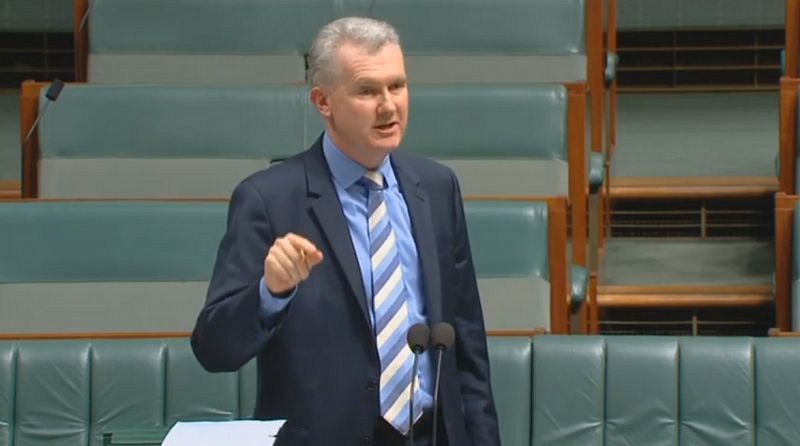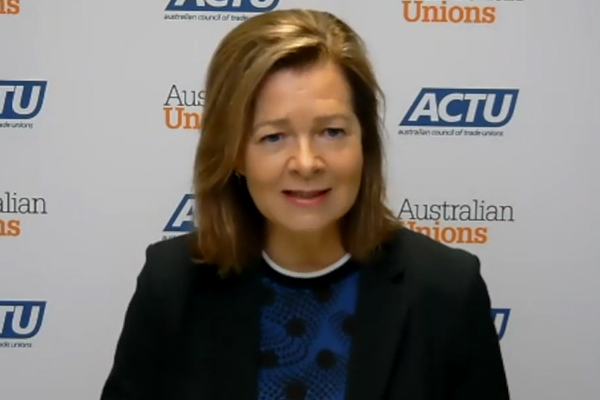Labor has stated that it will not support the Coalition's Ensuring Integrity Bill, writes William Olson.
AS THE COUNTDOWN to Parliament’s voting on the controversial Ensuring Integrity Bill quickly approaches, Attorney-General Christian Porter has reportedly amended the proposed piece of legislation to help it get through a Senate vote.
However, despite Porter’s gestures to give concessions to help the bill through, Labor frontbench Member Tony Burke continues to reject the Bill on the grounds of it being unfair to unions and working people, and attacking it for not putting forth a similar level of scrutiny towards dodgy employers engaging in wage theft and the general exploitation of workers.
Porter has reportedly introduced the concept of a demerits-points system applied to unions and its officials alike who commit breaches of the Fair Work Act.
But while Burke, the Government’s Shadow Minister for Industrial Relations, continues to call on Senate crossbench support ahead of a vote on the EI Bill that could happen as early as today, he remains resolute and unequivocal in the ALP’s united opposition to the Bill.
Burke said on Monday:
“Labor will not support this legislation under any circumstances.”
Confident that the ALP possesses the crossbench support to defeat the Bill, Burke maintains that in the view of his party, the Bill still has an extreme and dangerous quality to it regardless of whatever amendments Porter and the Morrison Government wishes to add to it in order to sweeten the deal.
Further, Burke told reporters:
This system will be weaponised only against unions and by extension workers who need a pay rise at a time of record-low wages growth.
It will be used to hobble the very organisations that fight wage theft and worker exploitation, and ensure safer workplaces.
While Burke and Labor continue to recruit eleventh-hour crossbench support for defeating the EI Bill, the Australian Council of Trade Unions (ACTU) continues to do the same, while pointing out the warnings of the Bill and its feared impact to the union movement should it get passed.
The President of the ACTU, Michele O’Neil, said in an email to union members:
Imagine if politicians had a "demerits points" system – misusing travel allowances or wrong paperwork would have the politician sacked and their party shut down.'
O’Neil also maintains that such a system doesn’t take into account for instances of accidental breaches of the policy – something Porter has insisted upon when drafting his own Department’s discussion paper on anti-wage theft legislation, another key talking point regarding industrial relations reform.
She wrote:
It’s the same for employers. If the same law applied, only three instances of wage theft would see a company shut down.'
Under Porter’s proposed demerit-points system, union officials would be deregistered if they accrued 180 points in offences, while entire unions would face the same fate upon piling up 900 points against them, tripling those respective figures over the current thresholds in the Fair Work Act. The points process would occur over rolling ten-year intervals, akin to demerit-point systems individuals have with their respective road authority agencies over drivers’ licences, for example.
ACTU secretary Sally McManus alleges that any of those thresholds would be equivalent to a three-strikes policy which unions would have to practice an even greater amount of duty of care than ever before, although courts and tribunals could determine the legitimacy of charges to be judged on a case-by-case basis.
“Every single union,” says McManus, “[even] if they're the best, most well-resourced organisation, is going to make a mistake.”
Meanwhile, Centre Alliance senator Rex Patrick, one of the key crossbenchers courted by both sides for support of their positions on the Bill, suggested the concept of the demerit-points system of punishment as well as a public interest test to determine the viability of the merger of unions. He is therefore pleased with Porter’s amendments to the legislation.
Patrick said of the Bill's amendments:
The original bill was a sledgehammer used to crack a nut, and the bill is now a nutcracker. It’s now got the right, appropriate response.
You can’t have a situation where the courts are expressing concern that the penalties are not adjusting conduct, which is what the law is supposed to do.
The ACTU further cites that if the legislation passes, the Registered Organisations Commission (ROC) – formed as an independent tribunal from the Fair Work Act that oversees the actions and activities of unions and employer associations, but viewed as a partisan body in that respect – would add to its depth of powers.
The ROC would be able to commence proceedings to shut down unions and disqualify union leaders based on a single civil breach of the Fair Work Act, such as workers protesting the actions of their employer or submitting paperwork late, the ACTU alleges.
McManus, speaking out against the powers of the ROC last month after the Federal Court had ruled that the Australian Federal Police’s raids on the Melbourne and Sydney offices of the Australian Workers’ Union were invalid, further warned that the ROC’s powers could be unprecedented and unchecked.
At the time, McManus declared:
“If the Ensuring Integrity Bill becomes law, the same Registered Organisations Commission who organised these discredited raids, will be given the power over a union’s very existence."
McManus also claimed that by pushing forward with the Bill, the Morrison Government is in the process of writing another chapter within its agenda of bypassing the union movement to give big business more power and influence, rather than dealing with workers’ long-standing issues of penalty rates, wage theft, stagnant wage growth, and insecure work.
She added:
“The Morrison Government’s only plan to address these issues is to ramp up their attacks on unions. Make no mistake, this Government, some of their donors and some employers would love to get unions out of the way so they can have free reign.”
William Olson is a freelance journalist and hospitality professional. You can follow William on Twitter @DeadSexyWaiter.
 This work is licensed under a Creative Commons Attribution-NonCommercial-NoDerivs 3.0 Australia License
This work is licensed under a Creative Commons Attribution-NonCommercial-NoDerivs 3.0 Australia License
Support independent journalism Subscribe to IA.












